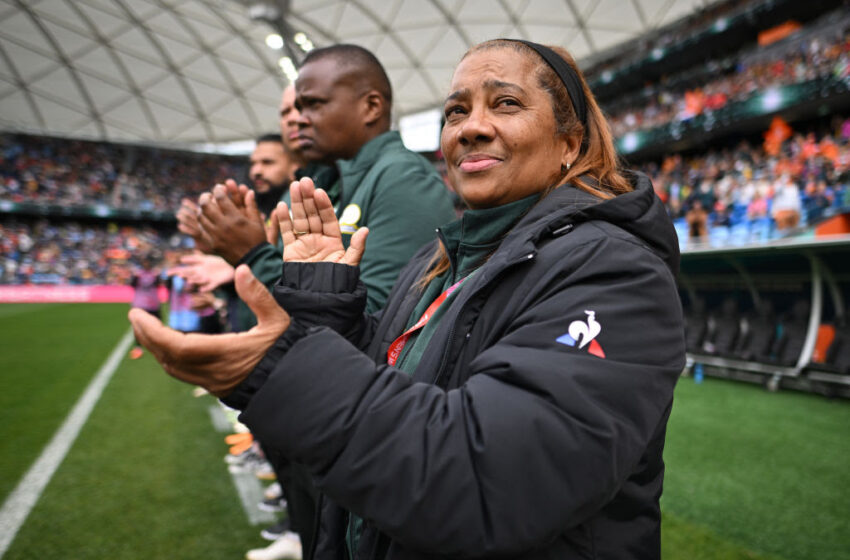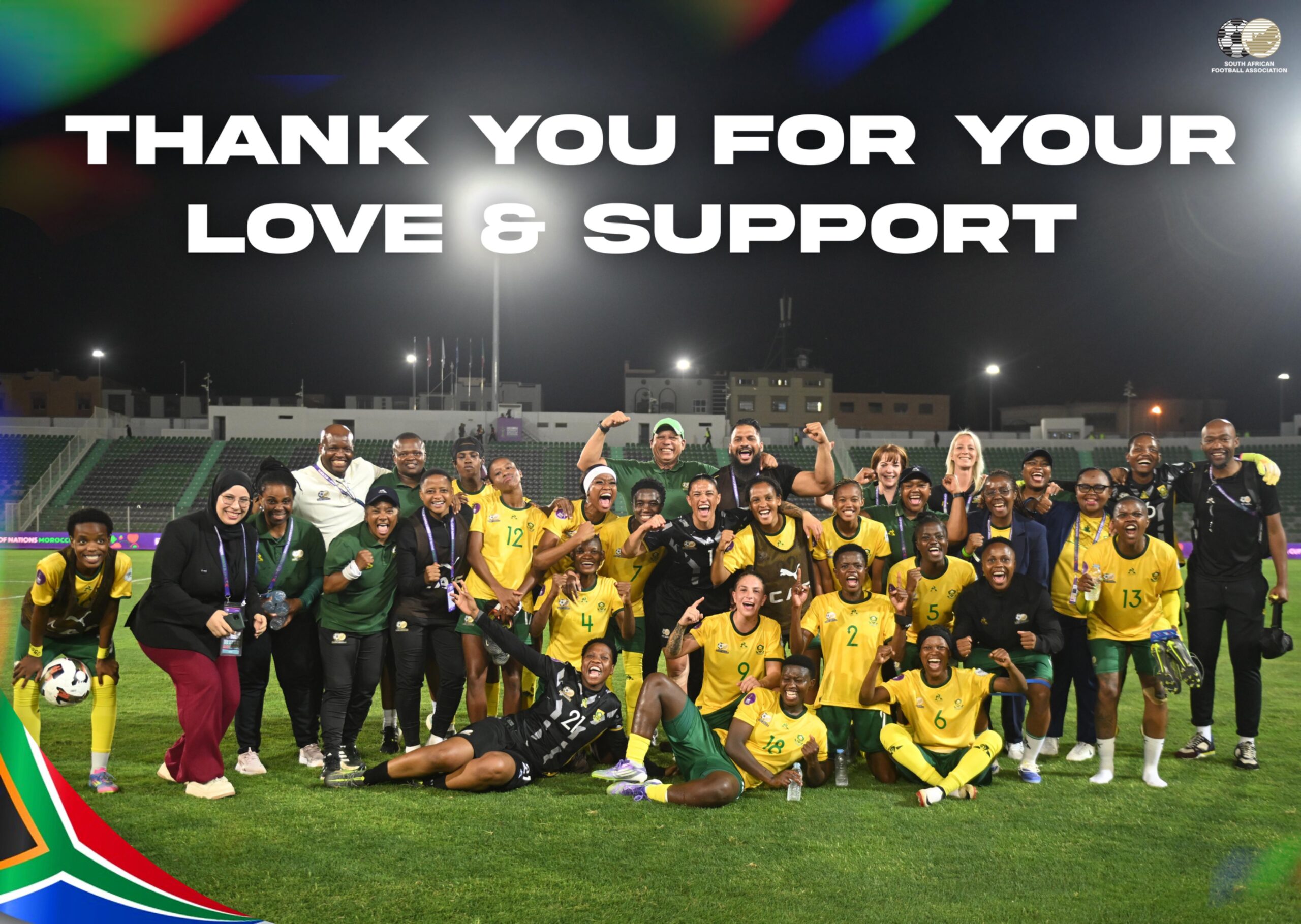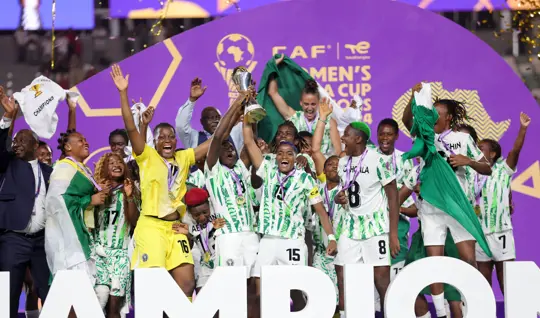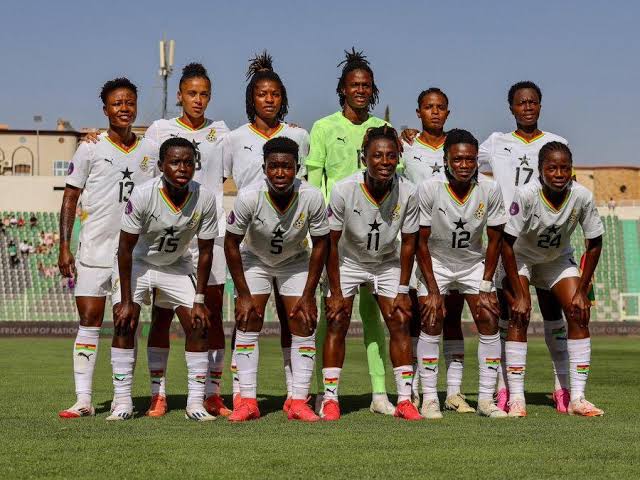Should South Africa sack Desiree Ellis after WAFCON disappointment?

From continental queen to questions of continuity—Should Desiree Ellis remain as Banyana coach after a WAFCON without a medal? Photo by Justin Setterfield/Getty Images.
When Desiree Ellis took over as coach of Banyana Banyana in 2016, South African women’s football was still clawing for continental recognition. A former captain of the team herself, Ellis brought institutional knowledge, emotional intelligence, and tactical ambition. Her early promise bore fruit in the 2018 WAFCON final appearance and was crowned with glory in 2022, when she led South Africa to a long-awaited and emotional first WAFCON title, defeating hosts Morocco in the final.
Ellis soon became more than a coach—she became a symbol of progress. With CAF Women’s Coach of the Year awards in 2018, 2019, 2022, and 2023, she stood tall as one of the most respected female coaches in Africa and beyond.
But in sport, yesterday’s trophies don’t always secure tomorrow’s tenure.
WAFCON 2022: A Golden Era Defined
That WAFCON title was no fluke. South Africa, under Ellis, played with clarity and conviction. Tactical discipline, seamless midfield transitions, and balanced wing play were central to their game. Even without key players like Kgatlana (injured mid-tournament), the team’s mental strength and technical cohesion shone.
Hilda Magaia’s brace in the final and performances from veterans like Refiloe Jane and Linda Motlhalo captured headlines, but it was Ellis’s game management and belief in a defined system that truly powered their victory. It marked a generational shift—and offered hope that Banyana could become continental mainstays.
World Cup 2023: Banyana’s Coming of Age
Riding the momentum of WAFCON 2022, Banyana approached the 2023 Women’s World Cup with confidence—and delivered one of Africa’s standout campaigns. They advanced to the Round of 16 for the first time in history, knocking out Italy in a dramatic 3–2 group-stage thriller before falling narrowly to the Netherlands.
That tournament made Ellis a household name globally. South Africa’s poise, particularly in transition, was admired. Kgatlana returned with flair, and the squad’s experience and tactical learning were evident. Many believed Ellis had cemented her place until at least the 2027 cycle.
READ ALSO
WAFCON: Ghana secures bronze with penalty over South Africa
How Super Falcons can soar to a 10th WAFCON title
The 2025 Road to WAFCON: A Bumpy Build-Up
By mid-2025, expectations were high. Ellis’s team had cruised through qualifiers and won the Three Nations tournament involving Zambia and Botswana. But in June, weeks before the tournament kicked off in Morocco, news broke of a training boycott. Banyana players refused to train over unpaid match allowances and poor treatment by the South African Football Association (SAFA).
Ellis was caught in the middle—tasked with preserving unity while placating discontented players and navigating SAFA’s ineptitude. While she managed to refocus the group and steer them to tournament readiness, critics argue that the recurrence of such off-field chaos under her tenure pointed to institutional fragility, and perhaps even coaching fatigue in dealing with administrative dysfunction.

WAFCON 2025 Campaign: From Title Defence to Missed Podium
Banyana opened their WAFCON 2025 campaign with a strong 2-0 win over Ghana—a performance that suggested Ellis’s blueprint was still functional. A 1-1 draw with Tanzania followed, exposing defensive lapses and lack of cutting edge, before they bounced back with a 4-0 win against Mali to top their group.
Their quarter-final against Senegal was a nerve-racking affair that ended goalless in regulation. South Africa eventually triumphed 4-2 on penalties, with Andile Dlamini’s saves providing the breakthrough. Yet, as the tournament advanced, injuries began to take a toll—Gabriela Salgado was ruled out, and Thembi Kgatlana did not feature due to personal matters.
In the semi-final clash with Nigeria, Banyana were overrun. Nigeria’s high-pressing intensity, direct forward play, and midfield energy overwhelmed Ellis’s side. South Africa lost 1–0, and Ellis admitted post-match that the team was “emotionally shaken” and struggled to recover from injury disruptions.
Then came the bronze medal match against Ghana—a game that many expected South Africa to win. Ellis’s side took the lead through Nonhlanhla Mthandi after a Ghanaian defensive error. But a second-half resurgence from Ghana brought an equalizer. The game ended 1-1 after regular time, and in the ensuing penalty shootout, Ghana triumphed 4–3, denying South Africa even a third-place finish.
It marked the first time in Ellis’s WAFCON history that her team failed to return with a medal.
Tactical Analysis: Familiar Patterns, Limited Evolution
Ellis’s preferred formations—either a traditional 4-3-3 or a variation of 4-2-3-1—continue to emphasize possession, control, and structured pressing. But in WAFCON 2025, these patterns became predictable.
South Africa were effective against less dynamic teams like Mali but struggled when opposition sides pressed high or altered pace. Against Nigeria, Ellis appeared tactically rigid, with late substitutions and minimal structural change. Critics say she relied too heavily on her system’s past success without adapting to evolving threats.
Additionally, while South Africa’s first eleven still ranks among Africa’s best, their squad depth has come under scrutiny. The bench lacks impactful game-changers, and when forced to make rotations, Ellis’s team often dipped in cohesion.
Player Management & Succession Planning
Another major concern is Ellis’s player selection strategy. While loyalty to veterans has offered continuity, it has also created bottlenecks for emerging talent. Players like Sinoxolo Cesane, Nomvula Kgoale, and Ronnel Donnelly have shown promise but remain underutilized.
Youth development and forward planning seem reactive rather than proactive. Ellis has done little to build a generational bridge that ensures consistency beyond her core squad. And with many key players nearing or over 30, the question arises: is Ellis the coach to oversee a full squad transition?
The Off-Field Burden: How Much Should Be Blamed on Ellis?
While coaches are often held accountable for all outcomes, Ellis is not solely to blame for the dysfunction plaguing Banyana Banyana. From poor travel arrangements to recurring pay disputes, the SAFA leadership has failed repeatedly to provide stable conditions for success.
However, Ellis’s critics argue that her public silence on some of these issues over the years has enabled systemic rot. She has chosen diplomacy over confrontation—a decision that, while understandable, may have cost her credibility with a wider stakeholder community demanding accountability and advocacy.
Should Ellis Be Sacked? Breaking Down the Debate
Reasons to Sack Ellis
-
Failure to win a medal at WAFCON 2025—her worst result as coach.
-
Tactical stagnation and lack of innovation under pressure.
-
Insufficient youth integration and squad rotation.
-
Weak record in pushing back against institutional failures.
Reasons to Retain Ellis
-
Only coach to win WAFCON for South Africa.
-
Reached back-to-back WAFCON finals before 2025.
-
Delivered a World Cup Round of 16 finish.
-
Maintains squad respect, experience, and continuity.
-
No clear successor with equivalent clout or tactical maturity.
Verdict? Retain, But Reform
Desiree Ellis’s legacy remains intact—but not untouchable. She has achieved what no other South African coach, male or female, has managed in senior international football. But WAFCON 2025 exposed significant flaws: tactical rigidity, selection conservatism, and a lack of long-term succession planning.
Not the result we wanted as we end fourth in the WAFCON 2024. Thank you South Africa for all the support…#banyanabanyana pic.twitter.com/THurqOoGau
— Banyana_Banyana (@Banyana_Banyana) July 25, 2025
South Africa should not sack Ellis immediately. Doing so would likely cause disruption, morale dip, and short-term instability. However, she must be held accountable to a clear roadmap:
-
Introduce younger players into key positions by 2026.
-
Improve tactical flexibility, including in-game responsiveness.
-
Demand greater autonomy from SAFA in protecting player welfare.
-
Set measurable performance benchmarks for the next 18 months.
If these reforms do not materialize, SAFA must then consider a transition plan—one that allows Ellis to exit with dignity while ushering in a new technical direction.




